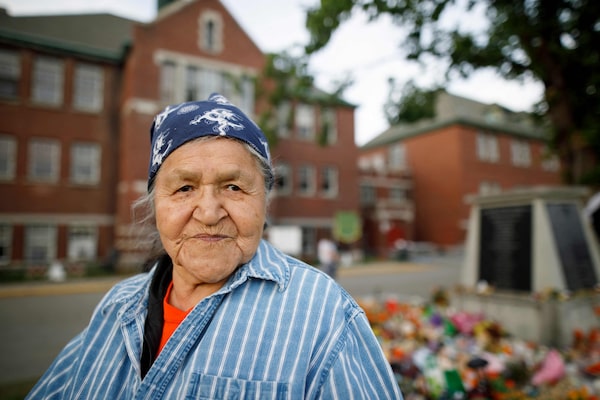
Columnist Tanya Talaga speaks with Kamloops Indian Residential School survivor Evelyn Camille, 82, in front of the school in Tk’emlúps te Secwe̓pemc.Melissa Tait/The Globe and Mail
Two weeks ago, while visiting Tk’emlúps te Secwe̓pemc in the B.C. Interior, I sat with Evelyn Camille, an 82-year-old survivor of the Kamloops Indian Residential School, where the remains of 215 children were discovered. She told me she never stopped looking out her window on the top floor of the school, hoping at the end of every week to spot a car containing one of her parents, coming to take her home – a car that never came.
Shortly after sitting with Ms. Camille, I arrived home to Toronto to see the news that a statue of Egerton Ryerson, who contributed to the design of Canada’s public-school and residential-school systems, had been toppled at the university that bears his name.
And yet, on June 21 – a day set out to be Indigenous Peoples Day, and at a time where we’re still absorbing the discovery of those remains – I will become a graduate of that Toronto school.
Say goodbye to Ryerson’s statue – and his name, too
The discovery of the unmarked graves brings us face to face with our suppressed history
Accepting an honorary doctorate of laws from a university named after someone who has caused boundless amounts of intergenerational grief on Indigenous families in the country we call Canada is not easy, to say the least.
The colonial education system nearly destroyed Indigenous peoples. It was Canadian policy. And yet, for the past 150 years, Canadians have upheld the myth that this country was founded to be a just society for all who inhabit it. This myth is repeated in Canadian history and English classrooms, Canadian literature, and in practically every one of our institutions and government agencies.
In reality, nothing could be further from the truth. Every single treaty Indigenous peoples had signed in order to share the land with those from across the ocean has been broken. The treaties were an outright land grab. The Indian Act, signed in 1876, is a racist piece of federal legislation to get rid of Indians, not to make sure we had any rights.

Ms. Camille next to a makeshift memorial at the former Kamloops Indian Residential School.COLE BURSTON/AFP/Getty Images
Indeed, Canadian governments continue to erode those rights – be it the federal government’s continued legal fight against First Nations children, which is now in its 14th year at the Canadian Human Rights Tribunal, or Ottawa and Ontario’s refusal to abide by the terms of the 1850 Robinson Huron Treaty and pay all descendants fairly, rather than a meagre $4 a year.
Egerton Ryerson was a part of this colonial fabric. He thought my mother’s descendants were unworthy of a quality education – that sticking us in industrial schools to “make the Indian a sober and industrious man” was one solution.
Canada’s first prime minister, Sir John A. Macdonald, held similarly bigoted views. In 1883, as the superintendent-general of Indian Affairs, he famously told Parliament: “When the school is on the reserve the child lives with his parents, who are savages; he is surrounded by savages, and though he may learn to read and write, his habits and training and mode of thought are Indian.”
Well, I thank my lucky stars that despite everything done by the likes of Macdonald, Ryerson and Duncan Campbell Scott, I think like who I am.
Names are integral to how we define and understand ourselves. So, what is in a name when it comes to Ryerson’s?
There should be no debate about renaming the university in the centre of Canada’s biggest city – where nearly 80,000 Indigenous people live – to something decided on by those who attend it.
But I decided to accept the doctorate from the school that bears Ryerson’s name for the Indigenous faculty members, staff and all the people I spoke to last week at the Ryerson Aboriginal Student Services graduation and awards ceremony, all of whom were so proud of what they had achieved. I did it for the students who paid money out of their own pockets to choose this school because they wanted the education that was denied to so many of their relatives. And I did it for my mom, for every late night she worked as a grocery clerk or sold Tupperware from her car while my young brother and I waited for her at home, so she could fulfill her dream of getting a college education.
The federal government has now acknowledged the importance of our names. On Monday, Ottawa announced that Indigenous people will be able to use traditional names on passports and other forms of identification.
That is wonderful – for those of us who know our family names. Many survivors and their families lost theirs after they were gutted by colonial institutions or Indian Agents who took children’s identities away. Those names remain elusive – pieces of the past one struggles to find in records kept by secretive dioceses that refuse to publicly give them up.
Ruinous names from the past don’t deserve to be part of our future; our lost names and our lost children deserve to be found and remembered. One way to do that is through the education our names had once denied us.
Keep your Opinions sharp and informed. Get the Opinion newsletter. Sign up today.
 Tanya Talaga
Tanya Talaga